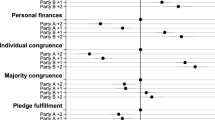Abstract
The purpose of the present paper is to consider how voters form perceptions about macroeconomic policy competence by focusing on the role of recent macroeconomic news: Do their perceived views of good news matter as much as bad news when they form beliefs about the incumbent government’s competence in managing the macroeconomy, in particular, with regard to their ability to control inflation and unemployment? We find that ‘bad’ news about unemployment persists when households are forming their perceived competence, whereas “good” news does not. That is, voters tend to display pessimistic bias when forming perceptions about the incumbent government’s competence.
Similar content being viewed by others
References
Akerlof, G., & Dickens, W. (1982). The economic consequences of cognitive dissonance. American Economic Review, 72(2), 307–319.
Begg, D., & Imperator, I. (2001). The rationality of information gathering: monopoly. Manchester School, 69(3), 237–252.
Birney, M., & Shapiro, I. (2005). The political uses of public opinion: lessons from the estate tax repeal. Mimeo, Yale University.
Blood, D. J., & Phillips, P. C. B. (1995). Recession headline news, Consumer Sentiment, the state of the economy and Presidential popularity: a time series analysis 1989–1993. International Journal of Public Opinion, 7(1), 2–22.
Bloom, H., & Price, D. (1975). Voter response to short-run economics conditions: the asymmetric effect of prosperity and recessions. American Political Science Review, 69, 1240–1254.
Caplan, B. (2002). Sociotropes, systematic bias, and political failure: reflections on the survey of Americans and economists on the economy. Social Science Quarterly, 83, 416–435.
Caplan, B. (2007). The myth of the rational voter: why democracies choose bad policies. Princeton: Princeton University Press.
Carroll, C. D. (2006). The epidemiology of macroeconomic expectations. In L. Blume & S. Durlauf (Eds.), The economy as an evolving complex system, III. London: Oxford University Press.
De Boef, S., & Kellstedt, P. (2004). The political (and economic) origins of consumer confidence. American Journal of Political Science, 48(4), 633–649.
Dua, P., Smyth, D., & Taylor, S. W. (1995). Public perceptions of macroeconomic policy during the Bush presidency. Southern Economic Journal, 61, 775–782.
Easaw, J., & Ghoshray, A. (2007). Confidence or competence? Do presidencies matter for households’ subjective preferences? European Journal of Political Economy, 23(4), 1025–1037.
Easaw, J., & Ghoshray, A. (2009). Households’ forming subjective expectations about the macroeconomy: is ‘bad’ news as important as ‘good’ news? Bath Economics Research Working Papers (forthcoming).
Eliaz, K., & Spiegler, R. (2006). Can anticipatory feelings explain anomalous choices of information sources? Games and Economic Behavior, 56, 87–104.
Haller, B. H., & Norpoth, H. (1994). Let the good times roll: the economic expectations of US voters. American Journal of Political Science, 38(3), 625–650.
Haller, B. H., & Norpoth, H. (1997). Reality bites: news exposure and economic opinion. The Public Opinion Quarterly, 61, 555–575.
Hibbs, D. (1979). The mass public and macroeconomic performance: the dynamics of public opinion towards unemployment and inflation. American Journal of Political Science, 23, 705–731.
Kahneman, D., & Tversky, A. (1979). Prospect theory: an analysis of decision under risk. Econometrica, 47(2), 263–292.
Katona, G. (1975). Psychological economics. Amsterdam: Elsevier.
Ludvigson, S. (2004). Consumer confidence and consumer spending. Journal of Economic Perspectives, 18(2), 29–50.
MacKuen, M., Erikson, R., & Stimson, J. (1992). Peasants or bankers? The American electorate and the US economy. The American Political Science Review, 86(3), 597–611.
Norpoth, H. (1996). Presidents and the prospective voter. The Journal of Politics, 58(3), 776–792.
Sims, C. (2003). Implications of rational inattention. Journal of Monetary Economics, 50(3), 665–690.
Rogoff, K. (1990). Equilibrium political budget cycles. American Economic Review, 80, 21–36.
Rogoff, K., & Sibert, A. (1988). Elections and macroeconomic policy cycles. Review of Economic Studies, 55, 1–16.
Smyth, D., Dua, P., & Taylor, S. (1999). Estimating the public’s social preference function between inflation and unemployment using survey data: The Survey Research Center versus Gallup. Empirical Economics, 24, 361–372.
Roos, M. (2007). Nonexpert beliefs about the macroeconomic consequences of economic and noneconomic events. Public Choice, 132, 291–304.
Author information
Authors and Affiliations
Corresponding author
Rights and permissions
About this article
Cite this article
Easaw, J. It’s all ‘bad’ news! Voters’ perception of macroeconomic policy competence. Public Choice 145, 253–264 (2010). https://doi.org/10.1007/s11127-009-9564-2
Received:
Accepted:
Published:
Issue Date:
DOI: https://doi.org/10.1007/s11127-009-9564-2




